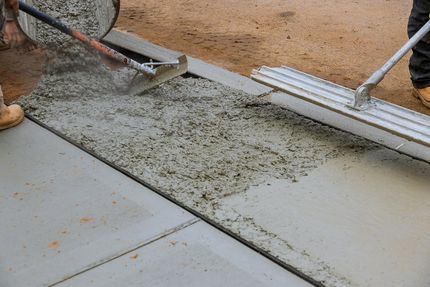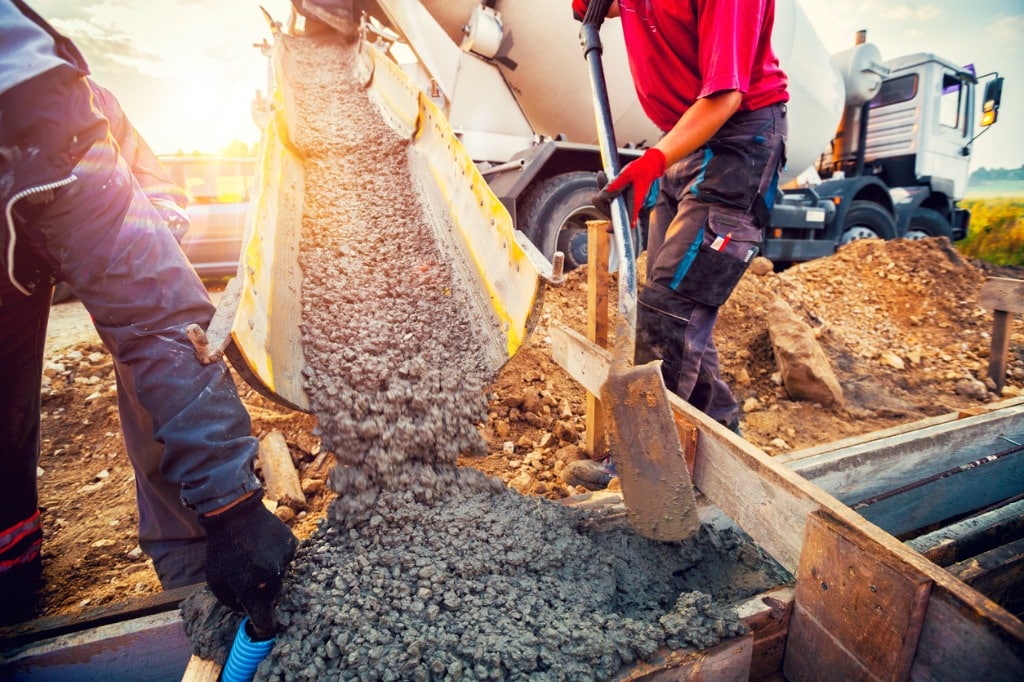
Comprehending the Crucial Duty of a Concrete Contractor in Modern Construction and Layout
Concrete service providers are vital to the building and design markets. Their experience assurances that frameworks are not only durable yet likewise aesthetically pleasing. They take part in numerous obligations, from project preparing to quality control, and team up with designers and engineers. With developing fads and technologies, their duty is a lot more important than ever before. Understanding their influence can disclose insights into modern-day building and construction practices and the future of structure layout.
The Relevance of Concrete in Building
Although various materials are utilized in building, concrete continues to be a cornerstone of contemporary building techniques due to its resilience, stamina, and convenience. This composite material, made from concrete, water, and accumulations, can withstand significant stress and is resistant to fire, weather condition, and insects, making it optimal for diverse applications. Concrete's adaptability allows it to be built into different sizes and shapes, promoting cutting-edge building designs.
Its thermal mass homes add to power efficiency, aiding to manage indoor temperature levels. The extensive accessibility of raw materials and the reasonably affordable of concrete also boost its appeal for large-scale projects, from business buildings to framework like roads and bridges. As urbanization proceeds to rise, the need for trustworthy and sustainable structure materials strengthens concrete's vital duty in building, making it a fundamental option for home builders and architects going for long life and resilience in their jobs.
Trick Obligations of a Concrete Specialist
Concrete service providers play a crucial duty in the building process, with a number of vital obligations that guarantee job success. Their jobs consist of job preparation and design, material option and administration, in addition to keeping top quality control and assurance throughout the task lifecycle. Recognizing these responsibilities is important for appreciating the service provider's influence on building and construction results.
Project Planning and Design
When beginning on a construction job, reliable task preparation and layout play an essential role in a concrete contractor's responsibilities. The contractor must team up very closely with customers, designers, and designers to comprehend the job's objectives and specs. This includes assessing site problems, examining style demands, and identifying the extent of job. A concrete specialist is also in charge of establishing budgets and timelines, making certain that all phases of the project straighten with general purposes. Furthermore, they should anticipate possible obstacles and create services to maintain task performance. By thoroughly preparing and making each facet of the concrete work, the professional establishes the foundation for successful implementation, making sure structural honesty and adherence to security standards throughout the construction procedure.
Material Option and Management
Reliable material choice and management are essential obligations for a concrete specialist, as these decisions directly influence the high quality and sturdiness of the last framework. Concrete contractors should examine numerous materials, consisting of accumulations, admixtures, and reinforcement types, to assure they satisfy job specifications and environmental conditions. They need to think about variables such as toughness, workability, and resistance to weathering. Additionally, handling the supply chain is crucial, as timely delivery of products can remarkably affect project timelines. Contractors have to keep relationships with vendors to secure high-grade sources while also checking stock levels to prevent lacks or extras. Inevitably, this careful selection and monitoring of materials contribute to the overall success of building projects and the longevity of the frameworks constructed.
Top Quality Control and Assurance
Quality control and assurance are extremely important in the building and construction sector, specifically for concrete professionals charged with providing resilient and trusted structures. Concrete service providers should implement extensive quality assurance steps throughout the building process, guaranteeing that all products fulfill defined laws and requirements (Concrete Contractor Near Me). This includes checking the blending, putting, and treating processes to stop defects and enhance structural honesty. Regular examinations are crucial, enabling specialists to recognize and correct problems quickly. In addition, concrete professionals often collaborate with engineers and engineers to ensure that the last item aligns with design specs. By sticking to rigid quality assurance procedures, concrete specialists not only protect the long life of their work however also copyright the count on of customers and stakeholders in the construction industry
Types of Projects Taken Care Of by Concrete Specialists
Although concrete professionals are often connected with large construction tasks, their experience encompasses a diverse range of applications. These professionals are important to property tasks, such as structures, driveways, and outdoor patios, ensuring longevity and aesthetic allure. In commercial building and construction, they add to the creation of floorings, walkways, and structural components that satisfy details layout and safety and security standards.
Concrete contractors are involved in framework jobs, consisting of bridges, roads, and passages, where their skills ensure architectural stability and longevity. They additionally play an essential role in attractive concrete applications, such as stamped concrete and sleek surfaces, which enhance the appearance of various spaces. In addition, their solutions include fix and maintenance work, addressing concerns like fracturing or disintegration in existing frameworks. This flexibility highlights the crucial function concrete contractors play in both decorative and useful facets of modern-day building and layout.
Skills and Qualifications Needed
Concrete professionals have to possess a varied set of qualifications and skills to successfully handle the variety of tasks they carry out. Effectiveness in concrete mixing, pouring, and completing is crucial, as is a solid understanding of different sorts of concrete, consisting of reinforced and decorative alternatives. Knowledge of building strategies, plans, and task management principles is important for successful execution.
Physical endurance and strength are essential due to the requiring nature of the work. Specialists should also have strong problem-solving abilities to attend to unforeseen challenges throughout tasks. Interaction abilities are vital for collaborating with customers, engineers, and various other tradespeople.
In addition, getting appropriate qualifications can boost a specialist's trustworthiness and broaden their career possibilities. Continuous education and learning in brand-new methods and materials maintains specialists competitive in a swiftly advancing industry. These abilities and qualifications jointly make it possible for concrete contractors to deliver high-quality results effectively and successfully.
The Function of Concrete Contractors in Safety And Security Compliance
Making sure safety and security compliance is an essential responsibility of concrete service providers, as they browse the complexities of construction websites. These specialists are charged with adhering to strict security laws and requirements, which are crucial for protecting against accidents and making sure the wellness of all site employees. Concrete Contractor Near Me. Concrete specialists should execute detailed safety plans that consist of training personnel on correct tools use and safety and security methods
In addition, they are accountable for examining materials and job processes to recognize potential threats. By carrying out regular security audits and risk evaluations, concrete contractors can proactively resolve problems prior to they intensify. Additionally, they team up with other construction experts, such as designers and job supervisors, to incorporate safety procedures into the general job approach. Eventually, the dedication of concrete professionals to safety and security conformity not just shields workers however also improves task performance and top quality, enhancing their essential duty in modern-day building and construction.
Fads and Technologies in Concrete Layout
Current improvements in concrete layout have actually presented a series of patterns and developments that prioritize sustainability and visual appeals. Sustainable concrete solutions, attractive ending up methods, and wise concrete innovations are reshaping the industry. These developments not only improve structural integrity yet likewise contribute to environmentally liable building and construction methods.
Sustainable Concrete Solutions
As the construction sector increasingly focuses on sustainability, innovative concrete remedies are arising to lower environmental impact while boosting efficiency. One famous pattern is using recycled products, such as crushed concrete and industrial byproducts, which not just reduces waste yet likewise enhances the concrete's residential or commercial properties. In addition, innovations in admixtures, consisting of fly ash and slag, add to lowered carbon exhausts throughout production. An additional substantial development includes the development of absorptive concrete, which permits water to move via and minimizes overflow, minimizing flooding and groundwater depletion. Furthermore, the rise of carbon capture modern technologies in concrete manufacturing holds assurance for additional emissions reduction. resource These lasting concrete solutions exhibit the market's commitment to ecologically responsible building and construction techniques.

Ornamental Ending Up Strategies
A myriad of decorative completing techniques have arised in concrete layout, changing plain surface areas into aesthetically striking elements. Methods such as marking, discoloration, and polishing enable a variety of visual opportunities, dealing with diverse design preferences. Stamped concrete mimics natural products like rock and brick, while discoloring introduces vivid colors that boost the surface's charm. Polished concrete, understood for its streamlined coating, includes refinement to both residential and industrial spaces. Furthermore, microtopping and overlay systems provide innovative options for revitalizing existing concrete. These techniques not just boost the aesthetic qualities however additionally enhance longevity and maintenance. As trends advance, the integration of ornamental finishes continues to play an important role in modern building and construction, weding performance with read this post here artistic expression.

Smart Concrete Technologies
While typical concrete stays a staple in building and construction, the appearance of clever concrete modern technologies is reinventing the sector by integrating advanced attributes that improve performance and sustainability. These innovations include self-healing concrete, which uses ingrained bacteria that turn on upon splitting, and sensor-equipped concrete that monitors architectural health and wellness in real-time. Additionally, piezoelectric and thermochromic concrete can adapt to ecological changes and create electrical energy, respectively. The execution of green additives and recycled materials additionally contributes to lowering the carbon footprint of concrete production. As these technologies continue to advance, they guarantee to boost durability, reduced upkeep costs, and advertise greener structure practices, making them critical for future construction jobs. The function of concrete specialists is significantly significant in taking advantage of these improvements.
Regularly Asked Questions
What Elements Impact Concrete Rates in Building Tasks?
Concrete rates in construction projects is affected by product prices, labor expenses, project size, place, availability of resources, and market demand. Seasonal elements and transport prices can additionally significantly impact the general pricing structure.
How Do Weather Impact Concrete Work?
Weather considerably influence concrete work; extreme temperature levels, moisture, and rainfall can influence setting times, curing processes, and total quality - Concrete Contractor in Dallas. Service providers have to adjust their schedules and methods to minimize these environmental impacts for effective task conclusion
What Is the Normal Timeline for a Concrete Task?
A regular concrete task timeline ranges from a couple of days to several weeks. Elements influencing this duration include job dimension, complexity, weather, and curing times, which collectively identify the overall completion timetable.
Can Concrete Specialists Aid With Layout Appointments?
Concrete specialists can indeed assist with layout appointments, supplying beneficial insights on material option, structural integrity, and aesthetic choices, ensuring that jobs fulfill both functional demands and the client's vision for the finished product.
What Prevail Misunderstandings About Concrete Durability?
Common misunderstandings concerning concrete sturdiness include the idea that it is unsusceptible damage which all types are equally solid. In fact, elements like mix design, ecological conditions, and upkeep greatly affect concrete's lasting efficiency.
They also play a crucial role in decorative concrete applications, such as stamped concrete and sleek surfaces, which boost the visual element of different spaces. Efficiency in concrete blending, putting, and completing is essential, as is a solid understanding of numerous kinds of concrete, consisting of strengthened and decorative alternatives. One famous fad is the use of recycled materials, such as smashed concrete and industrial byproducts, which not just lowers waste yet additionally boosts the concrete's buildings. While typical concrete remains a staple in building, the appearance of smart concrete technologies is changing the sector by incorporating advanced features that boost performance and sustainability. These developments consist of self-healing concrete, which utilizes ingrained microorganisms that turn on visit upon cracking, and sensor-equipped concrete that monitors architectural health in real-time.